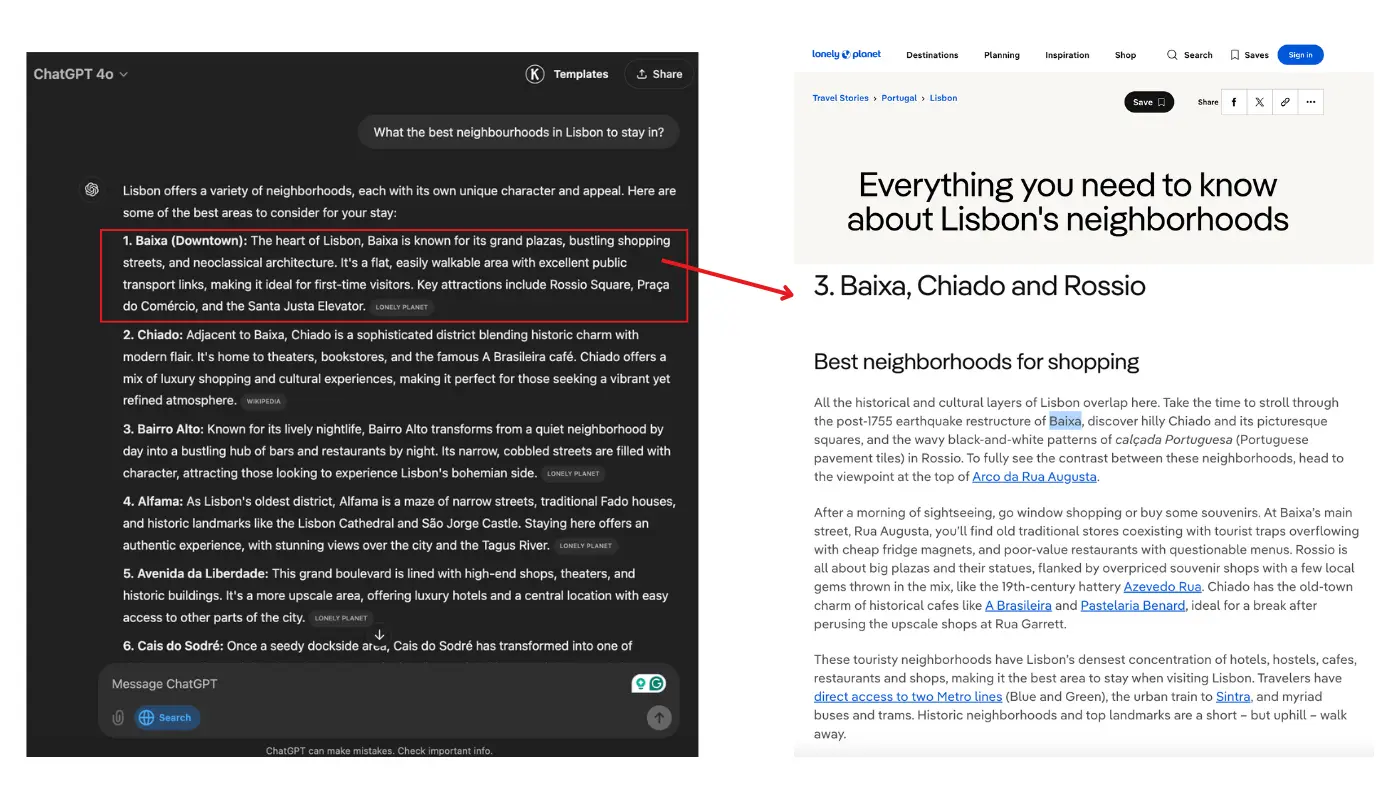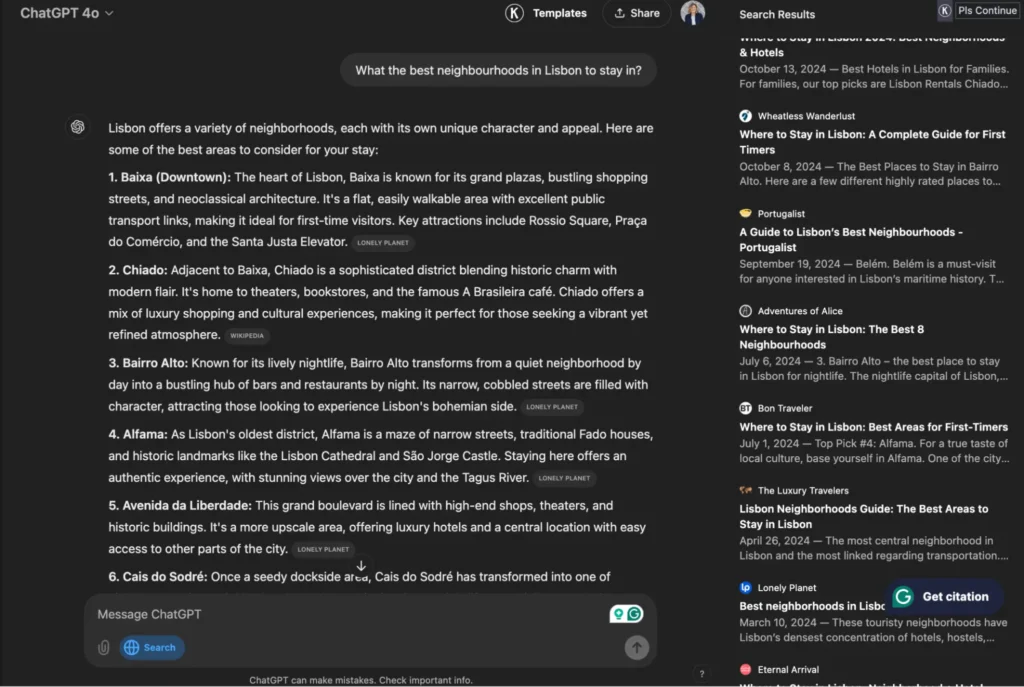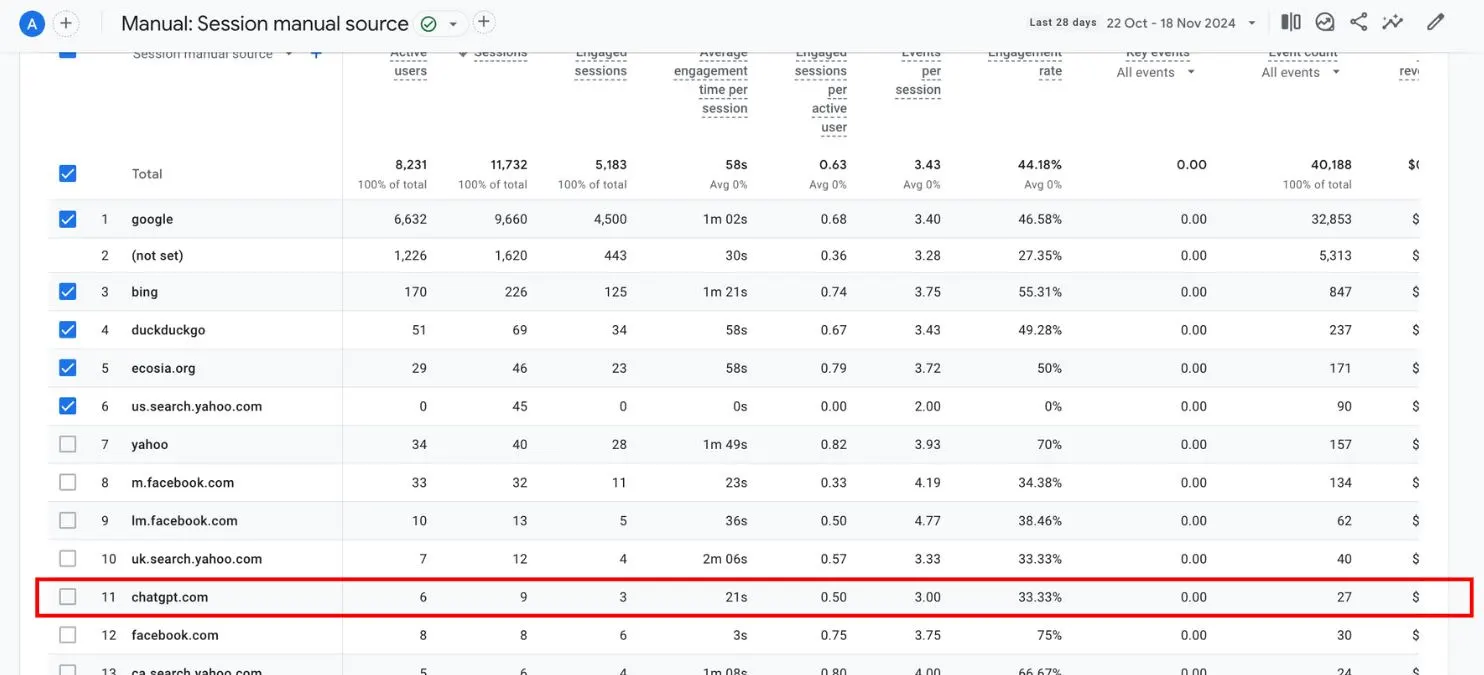ChatGPT’s search engine, introduced in 2024, allows the AI to gather real-time information from the web so it can deliver up-to-date answers.
For creators, having content appear in AI-generated responses can have pros and cons. On the plus side, ChatGPT showcases your work and can generate traffic, but on the other hand, detailed answers could mean users have no reason to visit your site.


Want your blog to stand out in the AI era? Dive into our tips to make your content more visible and attract the traffic you deserve.
Understanding how AI search engines rank content
ChatGPT’s search engine selects information by crawling websites and synthesizing relevant content into conversational answers. Unlike traditional search engines, it doesn’t display a list of links; it answers a user’s query directly with the most relevant details.
How AI might prioritize results
AI-driven search engines like ChatGPT prioritize content differently from traditional search engines, favoring factors like these:
- Relevance and context: AI matches user queries with the most contextually accurate content. Clear and concise writing directly addressing user questions is more likely to rank.
- Content structure: AI prefers content with logical organization, using clear headers, bulleted lists, and short paragraphs. These make it easier to extract and display information.
- Clarity and readability: AI aims to provide accessible answers, favoring content that’s easy to understand and free of jargon.
- Freshness: AI often values up-to-date content, especially for topics where information changes frequently, such as travel restrictions or events.
The biggest tip for creators is to create relevant, well-structured content that AI can easily extract and use in responses. But that’s not all.
Technical SEO best practices for AI search visibility
To increase visibility, you should also focus on technical SEO, specifically:
- Meta tag optimization: Keep your titles, meta descriptions, and headers short and to the point. This helps AI quickly figure out what your content is about.
- Structured data and schema markup: Add schema markup to your site to make your content more organized. It makes pulling accurate information from your pages easier for AI.
- Page load speed: Nobody likes a slow site, not even AI. Compress images, use reliable hosting, and trim unnecessary scripts to keep your site lightning-fast.
- Mobile optimization: Make sure your site looks great and works smoothly on mobile. AI loves mobile-friendly content since that’s where most searches happen.
- URL structure: Use simple URLs that describe precisely what’s on the page. Clean URLs make your content easier to find and understand.
Formatting content for AI compatibility

Along with technical SEO, don’t forget about structuring your content with AI-friendly formatting, specifically:
- Clear structure and headers: Organize your content with descriptive headings and subheadings. This structure aids AI in parsing and understanding your material, increasing the likelihood of itt being referenced.
- Question-based subheaders and short paragraphs: Subheaders mirror common user queries, such as “What are the best beaches in Portugal?” Pair these with concise paragraphs to align with natural search patterns and improve readability for AI models.
- Concise, informative writing: Craft content that is direct yet rich in detail. AI models favor clear, detailed answers without unnecessary fluff, making your content more likely to be featured in AI-generated responses.
Adapting content to match conversational AI queries

AI tools respond to natural, conversational user queries, so focus on:
- Natural language: Write in everyday language, mimicking how users phrase their questions. For instance, instead of “Popular attractions in Rome,” you might use “What are the must-see spots in Rome?”
- Common questions and answers: Anticipate and include your audience’s questions in your content. For example, a travel blog could feature “How do I get around New York City?” followed by a clear, direct answer.
Adapting your tone and phrasing to mirror user behavior makes your content more compatible with how AI selects and delivers information.
Measuring performance and tracking AI search’s impact on traffic
Traditional analytics tools don’t always label AI traffic clearly, but there are ways to track it.
1. Utilize Google Analytics 4 (GA4):
GA4 allows for detailed tracking of traffic sources. To monitor AI-driven traffic:
- Create a new exploration report:
- Navigate to the Explore section in GA4.
- Set Page Referrer as your dimension.
- Use Sessions as your metric and add “sessions” as your value
- Apply a filter with the following regular expression (regex) to capture AI sources:
https://(www.meta.ai|www.perplexity.ai|chat.openai.com|claude.ai|chat.mistral.ai|gemini.google.com|bard.google.com|chatgpt.com|copilot.microsoft.com)(/.*)?$
This setup will help you identify sessions originating from major AI chatbots and search engines.
2. Look at referral traffic reports:

In your analytics tool, look at the referral traffic section to see where your visitors are coming from. Check for referrals from AI platforms or tools – this can give you a good idea whether AI-generated responses are referencing your content.
3. Monitor server logs
If you can access your server logs, review them to spot user agents associated with AI tools. While this requires technical know-how, it’s a reliable way to understand how AI bots are interacting with your content.
FAQ
Can articles appear in AI search results even if they aren’t deliberately optimized?
Yes, articles can appear in AI search results even without optimization. Tools like ChatGPT prioritize clear, relevant, and well-structured content. If your articl naturally addresses user queries and provides detailed answers, AI may reference it.
How does a site’s Google ranking get affected if its pages appear in AI search engines?
A site’s Google ranking isn’t directly affected by appearing in AI search engines. However, AI tools that generate detailed answers could potentially reduce user clicks from Google – not because your ranking has changed, but because users are getting the info they need right from the AI.
Will Google penalize a site if its links appear in an AI search engine?
No. Tools like ChatGPT work separately from Google’s algorithm, so there’s no downside to your content being referenced in AI-generated answers. The best approach is to create high-quality, user-friendly content that performs well everywhere.
AI tools like ChatGPT are changing how people find information, including in travel. By tweaking your blog to be AI-friendly – think clear formatting and natural language – you can stay ahead of the game.




